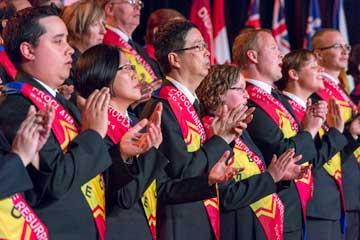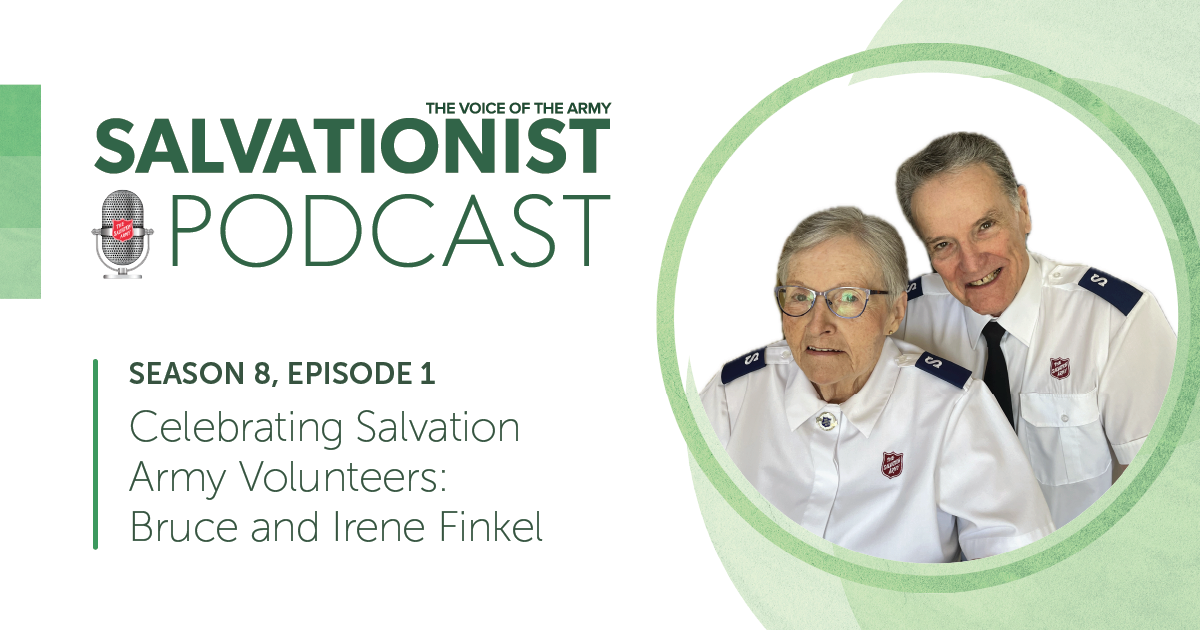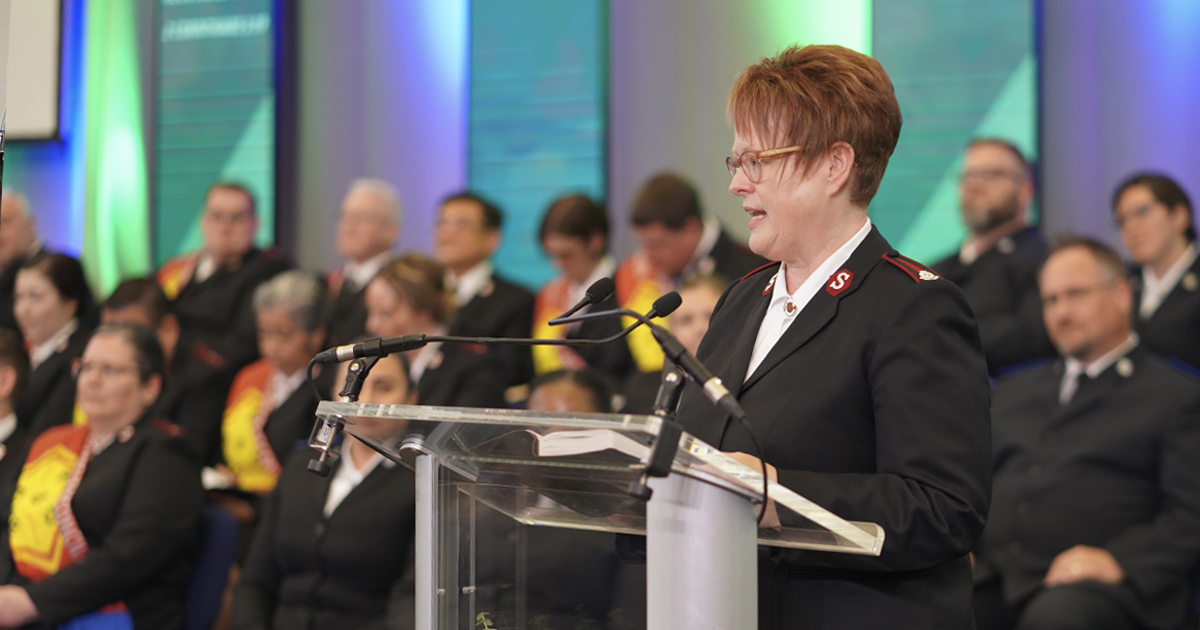 Proclaimers of the Resurrection are commissioned in Toronto (Photo: Timothy Cheng)
Proclaimers of the Resurrection are commissioned in Toronto (Photo: Timothy Cheng)
Go ahead, admit it! Before reading this column you already read the commissioning report, welcoming the Proclaimers of the Resurrection and graduates of our auxiliary-captains program into the territory.
While participating in the ordination ceremonies, I was also eagerly waiting to greet our new officers. I wanted to wave a banner amid the faces of skeptics and say, “God continues to bless the Army!” He does, but I'm also cautious. Projections show that the Army's status quo is unsustainable. By 2023, many of our lay leaders will have retired and there will be far fewer officers to carry out God's mission.
My hope in sharing this information is that readers will acknowledge the challenge and find the courage to say, “What can I do to help?” Though it is not my responsibility to future-proof the Army, sustainable leadership must be the legacy of present-day leaders, so I suggest the following responses:
1) Encourage personnel and value their accomplishments in a changing leadership landscape. More than 800 officers and 11,000 employees daily represent the Army's ministry and mission. Scan your surroundings and you will likely see a number of people new to Canada and to the Army responding to a call to serve. Lieutenant Peck Ee Wong, Lieutenant Thomas Yoo and Aux-Captain Fabio Correa are just a few examples of this much-needed and welcome change to the Army's leadership profile. The landscape of leadership is also aging. Officers are extending work beyond age 65 and retired officers are continuing their covenanted service. Salvationists such as Glenda and Oren Cole and Rex Thompson are leading corps after many years of faithful soldiership. We also thank God that others are returning after many years of absence from ministry.
2) Raise the level of engagement for those committed to fulfilling God's will. I recently commissioned Aux-Captain Ronald Farr as a captain. He and his wife serve at the Warehouse Mission in Toronto and if you took a close look at their ministry, you'd simply say, “Wow!” Another example would be newly commissioned Lieutenants Darryl and Kimberley Burry, who, while raising four children and leading Comox Valley Community Church in Courtenay, B.C., have prepared themselves for officership through field-based tailored training. Finally, second-year cadets Randy and Cathy Shears are embracing ministry later in life and are demonstrating that obedient faith is not based on a set of life's circumstances.
I have a vision of sharing ministry together without compromising the officer's covenanted role. We do this as we keep our College for Officer Training at the centre of preparation requirements for leadership. Perhaps you may picture yourself in the examples noted above or you may need to create your own story. This is only a sampling of what unfolds when we say “yes” to God.
Across Canada and Bermuda, the Army is an evangelical expression of God's church. We're also a denomination with an acute social conscience. Every 20 seconds, someone opens the door to a Salvation Army building hoping for help and dignity. I feel confident that, as the Army leans on the sufficiency of God's grace and the capacity of its people, it will serve well and be a transforming influence in its communities. Part of being fit for purpose includes the availability of God's people to serve.
In his book, The Mission of God's People, Christopher J.H. Wright asks a question worthy of our consideration: “The issue is not, 'Is there a mission?' but rather, 'Does God have a church for his mission?' ” We are called to move into a needy world and unashamedly share the transforming gospel. We can lead from a position of strength, challenging the status quo and believing in God's plan for the Army.
I love the Apostle Paul's expression in 2 Corinthians 2:14: “Thanks be to God, who in Christ always leads us in triumphal procession, and through us spreads the fragrance of the knowledge of him everywhere” (ESV). Some say that we are losing the battle, but Christ knows how the story ends—not a march to the death, but a triumphant procession.
Commissioner Brian Peddle is the territorial commander of the Canada and Bermuda Territory.









After some time in another church the Lord placed the call on my life to go plant a church. One which is growing steadily. Now I am not yet leading Canadas newest mega church but our growth is as a result from listening to the direction of the Holy Spirit.
When I was in the ranks of the soldership I so wanted to serve in the capacity of an officer but nothing ever went past the Corps Officer office. Why the biggest hurdle was I did not have a grade 12 education. My ministry experience was never looked at. I could work in the local thrift store, I could work in the Food Bank but because I did not have a grade 12 I was not acceptable for applying to officership.
I think that the requirements of education especially for older adults would be to allow persons to apply as a mature student if they don't have a grade 12. Almost every other college and university has this provision.
There needs to be more field based training. There are some people that really dont need to head off to Winnipeg. There are many that have previous training, and some that have previous experience and could learn via online, and could instead head off to their first appointment.
I also think that the Salvation Army should re-look at adoption style recruiting. I know of a great ministry couple that considered officership even had support of the local officer but where told they need to join the local corps then go to training college. Seriously the Army says they need leaders and have a couple with close to 20 years of ministry plus high levels of education but cant be considered for adoption. Sorry you loose the argument of not having adequate leadership numbers when we do this. In the beginning of the Salvation Army, Booth often accepted not only other ministers but also other ministries.
May I also suggest changing the top down approach to candidate selection. Local officers do know their soldiers better then the Candidates Secretary in most cases. I think having the local officer select first candidates to be approved by the divisional commander then by the Candidate Secretary.
I also think of using Envoys is something that really should be looked at promoting. Especially for older soldiers who have entered retirement and could provide oversight of a smaller corps where having a fulltime appointment. Envoys could also be employable persons that do tent making. I do this in my church and it is growing. All pastoral staff in my congregation obtain their income from outside employment.
I think the numbers of officers the Army in Canada commissions could drastically increase is if the powers to be took a long hard look at the recruitment rules and necessary changes.